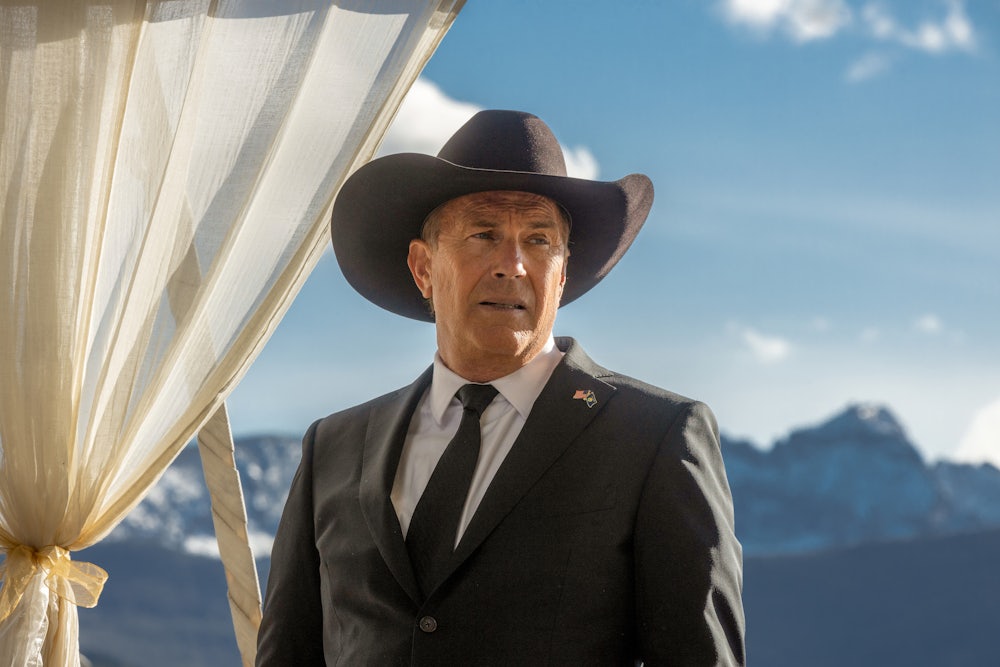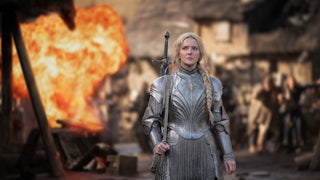Yellowstone is the most popular show you’ve probably never seen, redolent of a bygone era when workers of the world would unite around watercoolers to discuss the latest TV. Yellowstone’s season four finale drew over 11 million viewers—astonishing numbers in our moment of microcommunity, when fewer and fewer people watch the same entertainment. By this point in its run—the fifth season premiered on Sunday—Yellowstone is as popular in major cities as it is in smaller ones. Yet for all its success, the show has received surprisingly little press. TV reviewers, it seems, would rather discuss the most recent (and dull) Game of Thrones spin-off than the machinations of a Montana rancher.
Though the literati might ignore it, Yellowstone’s appeal is easy to understand. It’s far more Oz than The Sopranos, in the sense that it’s a soap opera overlaid with the talky, pseudo-intellectual veneer of “prestige TV.” Its protagonist, John Dutton III (Kevin Costner), is a “fifth generation rancher” and owner of the eponymous Yellowstone Dutton Ranch, one of the largest cattle ranches in the United States. The ranch has been in Dutton’s family for generations, and the show catalogues its and Dutton’s, triumphs and travails. There’s lots of killing (often committed by major characters), sex (everyone on the show is extraordinarily hot), and bloviating (Dutton loves reminding people that whatever he does, he does for his ranch).
Yellowstone is a decidedly “red state,” small-c conservative, show. In the fifth season’s premiere, Dutton, who has become governor of Montana (for the ranch, of course), makes clear that he represents “the opposite of progress.” And indeed, the primary story thread linking Yellowstone’s five seasons is the age-old conflict between East Coast capital—which wants to “develop” Montana—and western cowboys—who want to retain their way of life. For Dutton and his cowboy comrades, there’s no space in Montana for outsiders, and anyone who disagrees is a shill, scammer, or fool.
With these battle lines drawn, Yellowstone is one of the only contemporary shows to highlight the tensions engendered by modernization and development and, in so doing, reveal the anguish of people who feel like they’re losing communities and receiving little but Starbucks in return. It’s a show that endorses the struggle against modernity, even as it appreciates that “progress,” American-style, is unlikely to be halted. And it’s here that Yellowstone’s deeper appeal may be found—it’s a show for and about history’s losers that glorifies their fight.
One of the most interesting things about Yellowstone is its valorization of Dutton’s style of leadership. Whereas The West Wing turned the career technocrat into an Olympian hero, Yellowstone adopts a more, shall we say, Jeffersonian approach. The show’s fifth season premiere presents Dutton as the last honest man, the yeoman rancher who would rather be tending his flock than serving as governor, and claims that it is this disgust with politics that makes Dutton the best politician of them all. Dutton, in fact, is a bit of a fascist; as he tells his political opponent when the latter calls to concede the gubernatorial election: “I fight for what’s right; I don’t really care who supports it.” Dutton has no interest in the democratic will—the only things worth protecting, of course, are the ranch and (in a distant second) his family. Property, as always, above all.
The irony of a show like Yellowstone endorsing Dutton’s property-first localism, of course, is that Dutton’s ancestors were themselves outsiders, once upon a time. (Yellowstone has a prequel series set in the late nineteenth century, 1883, which “follows the Dutton family as they embark on a journey through the Great Plains to seek a better future.”) To be fair, Yellowstone is at least somewhat aware of this; there are Native American characters, though in the fifth season’s premiere they don’t have much to do. Nevertheless, the show doesn’t quite address the tension in the fact that Dutton, whose ancestors were the shock troops of capitalist development, now wants to mitigate the damage done to his community by the very same forces of modernity that made his and his family’s life possible—integrated markets, advanced technologies like trains and cars, capital itself. You can’t, it turns out, take only the parts of capitalism that benefit you. Instead of exploring this irony, though, we get the same-old “good guys” versus “bad guys” framing, with Dutton coded as good and capitalist outsiders coded as bad.
Dutton’s struggle against “progress” is reflected in his own family. Two of his children, Beth (Kelly Reilly) and Kayce (Luke Grimes), seem more or less on Dutton’s side; they want to protect the ranch. But Dutton’s other child, Jamie (Wes Bentley)—whom we learn is adopted—is very much in favor of development and believes his father’s obsession with protecting the cowboy lifestyle is, for lack of a better phrase, backwards. And it’s never in doubt which side the show is on: Jamie is presented as an oily weasel of questionable loyalty—to take one example, earlier in the show Jamie bucked his father’s wishes and ran for attorney general—while Beth works directly with her father, and Kayce is a livestock agent willing to break the law if it serves the cause of justice. To be a true Dutton, apparently, you’ve got to have Dutton blood.
The centerpiece of Yellowstone’s fifth season’s premiere is the speech Dutton gives immediately after being confirmed as governor. Here are the fifth-generation rancher’s first three acts: He cancels a local development project (there were plans to build an airport and associated commercial and residential properties); doubles the property taxes for nonresidents of Montana; imposes a 6 percent sales tax on nonresidents; and initiates vehicle registration fees for nonresidents. Dutton, in effect, hopes to reembrace the federalism of the antebellum era, turning the clock back over 160 years and ensuring that outsiders from California and New York (the two locations he mentions by name) are unable to escape the pollution, traffic, and mismanagement of the coasts for his Montana idyll. (Dutton doesn’t seem too concerned with the fact that, according to the Montana Budget & Policy Center, “Montana receives more in federal funding than it sends to the federal government in tax dollars,” and that his attempt to wall off the state might have negative consequences.) In this way, Yellowstone is very much a show about the “new Civil War” that some Americans consider inevitable. But instead of waging this war with guns, Dutton wages it with federalism.
What Dutton cannot appreciate is that the forces of capital will not simply be stopped in their tracks. In our current world, progress is inexorable, development unavoidable. And to its credit, Yellowstone understands this and considers Dutton’s project quixotic. The fifth season’s premiere ends with an inaugural party held at Yellowstone Dutton Ranch. Everyone’s drinking whiskey, cowboys are playfully lassoing each other, and a country band plays in the background. But just off the property, Rip Wheeler (Cole Hauser), one of Dutton’s ranch hands, lays back, surveying the scene with a laconic despair. When Wheeler’s wife Beth—Dutton’s daughter—asks him what’s going on, Wheeler responds that the new governor’s inaugural party reminds him of Nero fiddling while Rome burns. The message is clear: Dutton will lose, and probably soon.
Yellowstone finds something noble in Dutton’s effort to stand athwart history, yelling stop. Even if the rancher is doomed to fail, at least he put up a fight. From this vantage point, one can read Yellowstone as red America’s cultural death rattle in an era in which fewer and fewer people live or work outside major cities. Dutton’s world might be ending, but he doesn’t want to live in the new one anyway. Might as well fight like hell to protect what’s yours.






